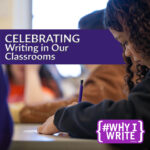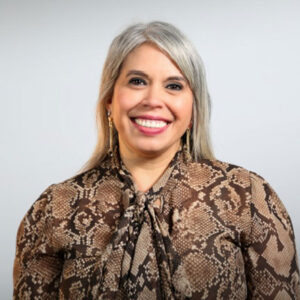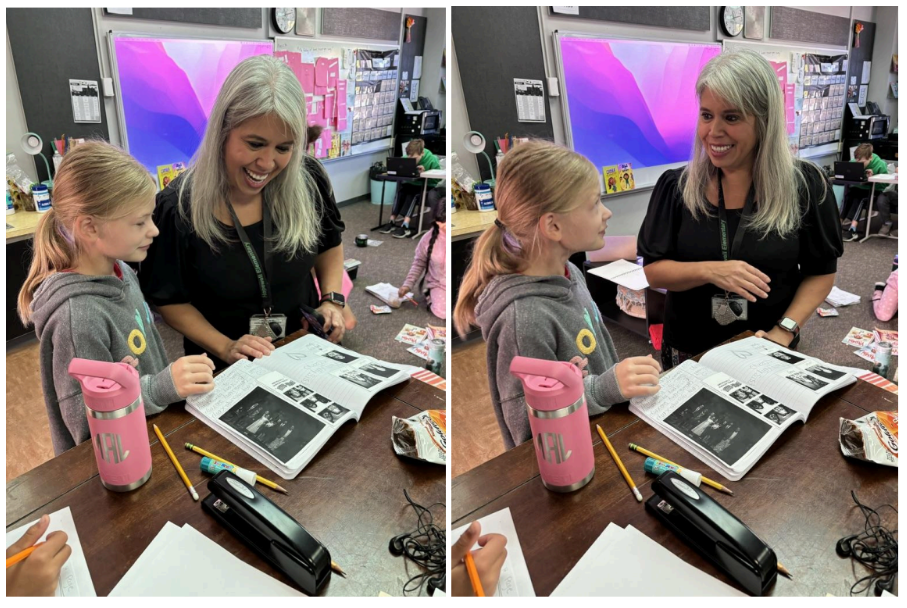 This blog post was written by NCTE member Stella Villalba as part of a blog series celebrating the National Day on Writing®. To draw attention to the remarkable variety of writing we engage in and to help make all writers aware of their craft, the National Council of Teachers of English has established October 20 as the National Day on Writing®. Resources, strategies, and inclusion in a blog post does not imply endorsement or promotion by NCTE.
This blog post was written by NCTE member Stella Villalba as part of a blog series celebrating the National Day on Writing®. To draw attention to the remarkable variety of writing we engage in and to help make all writers aware of their craft, the National Council of Teachers of English has established October 20 as the National Day on Writing®. Resources, strategies, and inclusion in a blog post does not imply endorsement or promotion by NCTE.
Often when we think about writing, writers, and a literary life, we think of hours upon hours of writing alone. We hear about the solitude that writers dwell in as they craft their work and transform themselves in the process. Those statements are not wrong. Yet I believe they are incomplete because to sustain a life engaged in crafting words, stories, poetry, we must also cultivate the love for the craft. And that love most often begins in preK–5 classrooms. More importantly, that love often starts in community.
It is true that writing is an individual endeavor, but it does not need to stay that way. Writing Workshop is a place of possibilities, of storytelling, and the beautiful art of listening. When teachers work alongside writers in our classroom, we are nurturing an environment where we play with language, listen to poetry, and re-read lines over and over again. When teachers engage in dialogue with writers about characters and plots, we are witnessing how storytellers navigate worlds. And when teachers write alongside writers, now we are building a community of writers.
As an educator, I’m part of my class community. Together, we are discovering authors, trying out a new language structure, and rehearsing reading our stories for an audience. When our students see us writing alongside them, drafting and revising, and asking for feedback, they realize that we are learners, storytellers, artists, writers . . . just like them.
Yes, as educators we must confer with our writers. Those one-on-one moments are precious. We must protect that time.
And . . .
We must also be part of that community of writers by taking risks with our own writing. By modeling by example how we are reading like writers, considering word choices, or pondering about the ending of a story. When they see us collecting ideas or small moments in our own notebooks, we are not just telling them that this is what they must do. We are showing them that noticing and collecting ideas is a practice that we also engage in as observers and participants of this world.
Recently, I was conferring with one of our amazing writers, and she was showing me her collection of small moments inspired by a series of photos she collected in her notebook. I was delighted that she is finding ways to inspire herself by exploring possibilities. The next day, I brought to school one of my (many) notebooks to share with her how I also cultivate this practice of combining photography with writing. That moment, I know we saw each other as two writers who are finding their way in this world by trying different approaches to composing.
Writing is about taking risks. There is a lot of vulnerability in writing. There is also a lot of support and inspiration in community. It matters the ways we cultivate a learning space where students feel safe exploring multimodal ways of composing, creating, and sharing. When students see us taking those risks, they know we believe in this work, in nurturing this writer’s life together.
Recently, during one of our mini-lessons, we were discussing where we get ideas as writers. Together, we started compiling a list. As the students were settling into their own writing spaces, I heard an amazing conversation between two students. It gave me an idea for a story. Right at that moment, I told them that I would like to write a story that just came to my mind. I opened my laptop, and 15 minutes later I had part one of a draft. I wanted to share it with the boys whose conversation inspired me to write. They were eager to give me feedback and nudged me to share it with the rest of our community. Again, at that moment, we saw each other through different lenses. I value their feedback, and they value my attempt at writing a funny story.
As we celebrate October 20 as the National Day on Writing, I leave you with some invitations as an important part of the writing community:
1. Consider cultivating moments of writing alongside your community of writers.
2. Share the different ways you compose and cultivate a writer’s life.
3. Bring those mentor authors to the classroom by sharing what you are reading.
4. Ask students for feedback on your own work.
5. Celebrate each other . . . every step of the way.
I have no doubt that love for writing starts in community. The African proverb reminds us that “If you want to go fast, go alone. If you want to go far, go together.”
Onward . . . together.
 Stella Villalba was raised and nurtured in a bicultural and bilingual household. Born in Argentina to parents from Paraguay, Stella learned that being a multilingual learner is a superpower, and it’s through that lens that she teaches, listens, and leads every day. She believes that multilingual learners deserve an equitable education that protect and honor their languages, literacies, and lived experiences. She is currently a teacher-leader and a staff developer coaching and mentoring educators to be ready for a global education that is rooted in multilingualism, biliteracy, and culturally and community-sustaining pedagogy. Two things that bring Stella joy are conferring with a child and reading a large stack of picturebooks.
Stella Villalba was raised and nurtured in a bicultural and bilingual household. Born in Argentina to parents from Paraguay, Stella learned that being a multilingual learner is a superpower, and it’s through that lens that she teaches, listens, and leads every day. She believes that multilingual learners deserve an equitable education that protect and honor their languages, literacies, and lived experiences. She is currently a teacher-leader and a staff developer coaching and mentoring educators to be ready for a global education that is rooted in multilingualism, biliteracy, and culturally and community-sustaining pedagogy. Two things that bring Stella joy are conferring with a child and reading a large stack of picturebooks.
It is the policy of NCTE in all publications, including the Literacy & NCTE blog, to provide a forum for the open discussion of ideas concerning the content and the teaching of English and the language arts. Publicity accorded to any particular point of view does not imply endorsement by the Executive Committee, the Board of Directors, the staff, or the membership at large, except in announcements of policy, where such endorsement is clearly specified.

